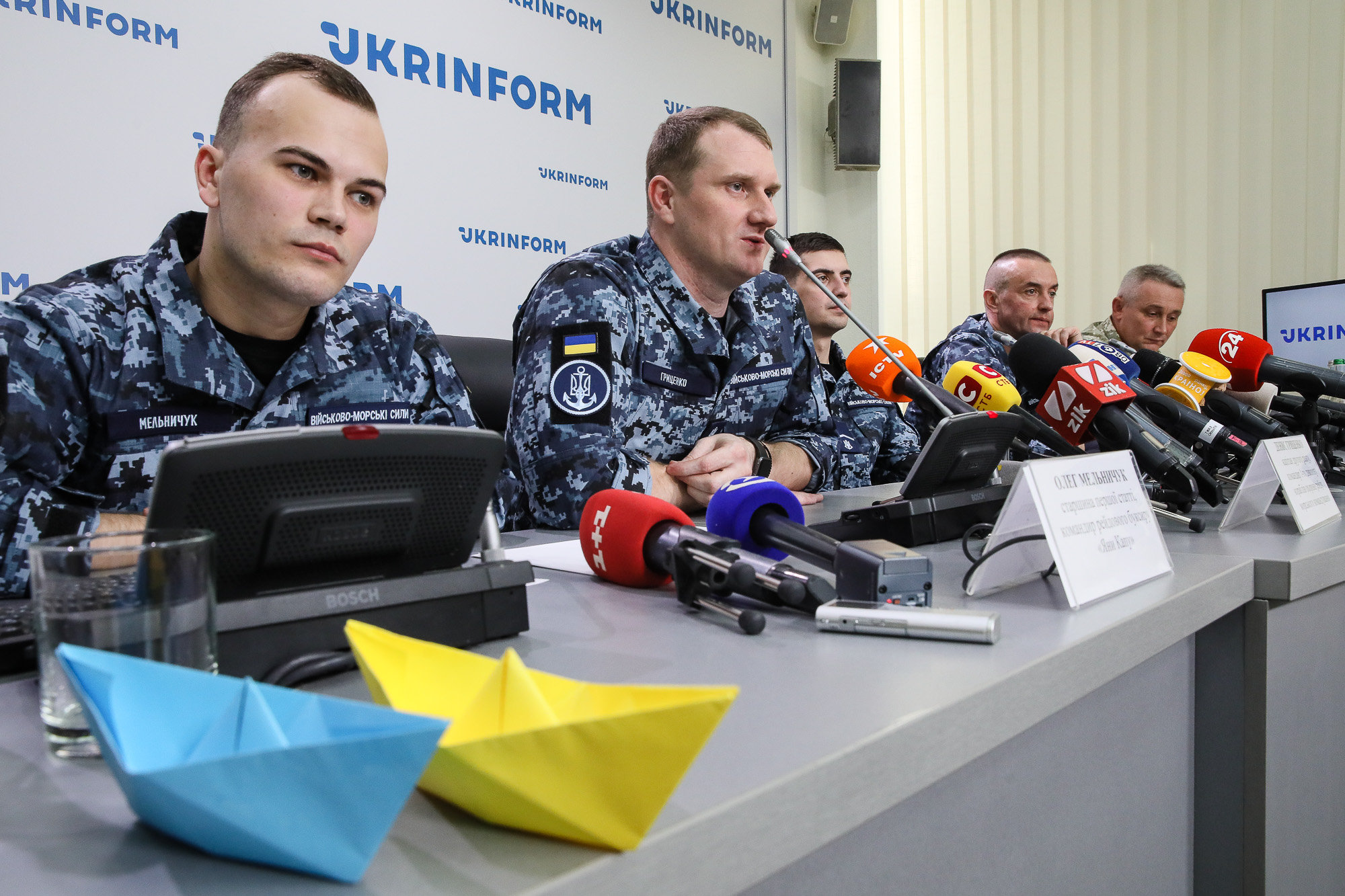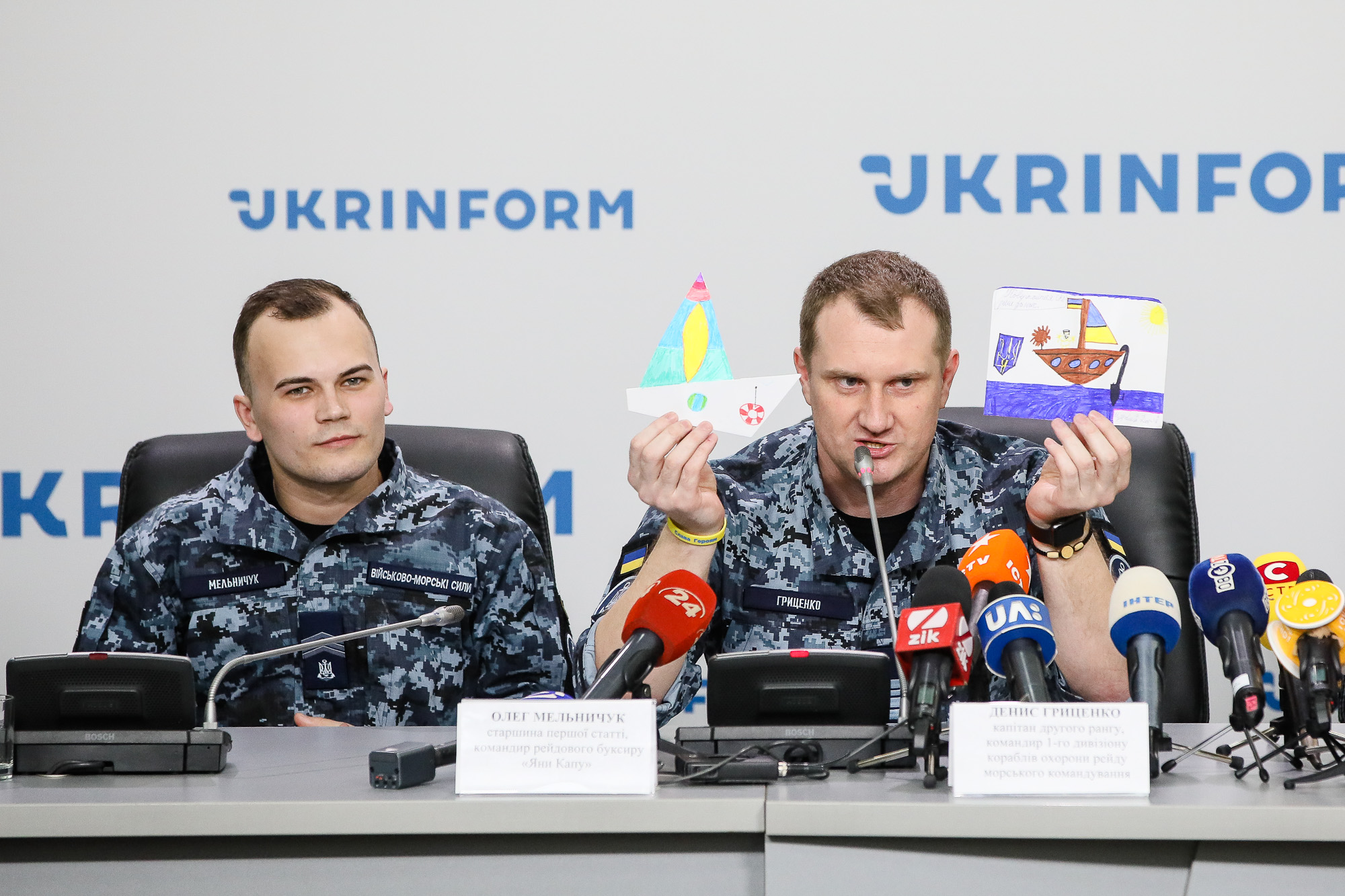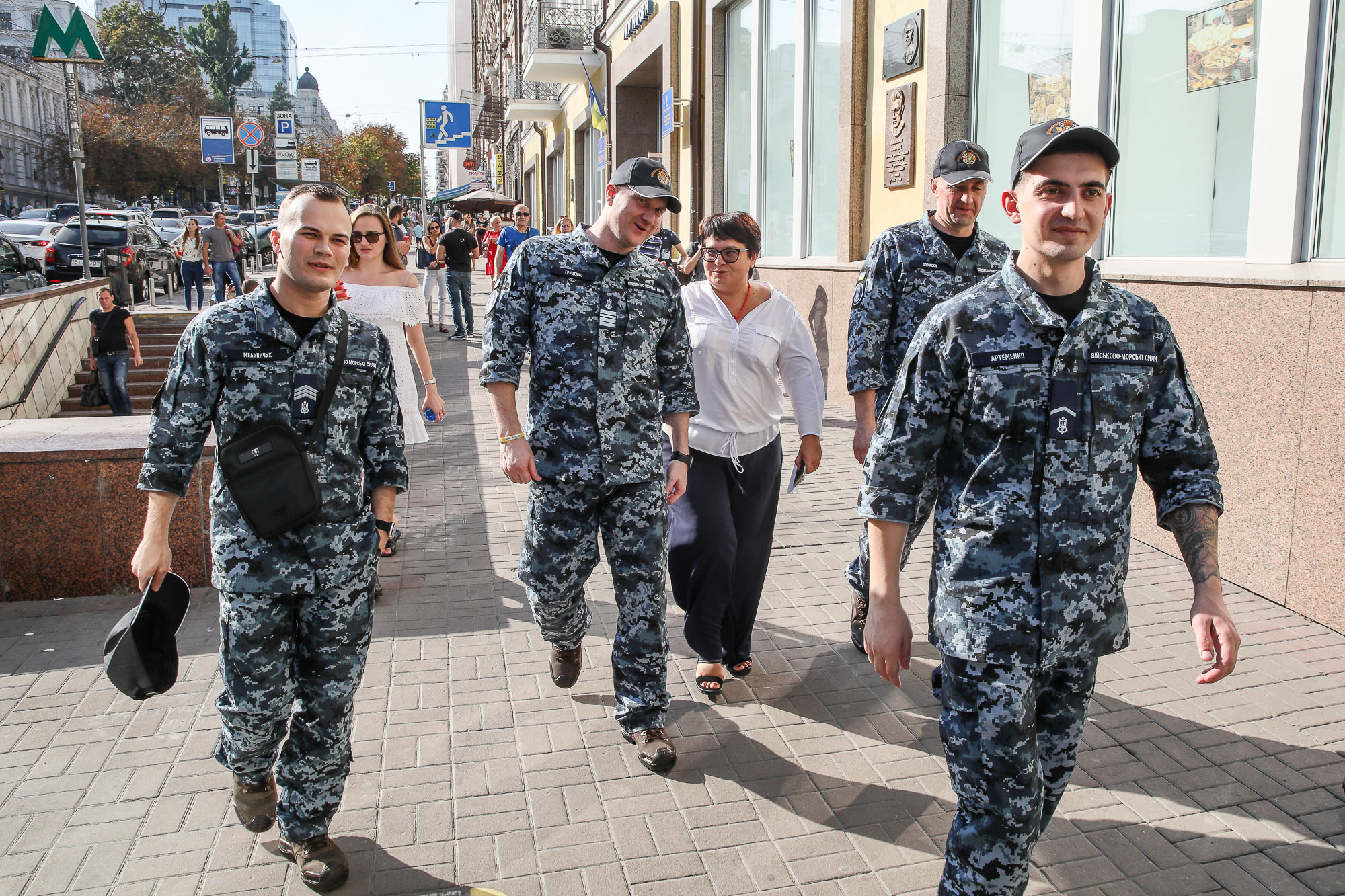For many months, the return of 24 Ukrainian sailors attacked and captured by Russia in the Black Sea in November remained the nation’s focus.
And here they are back home again — freed from a Moscow prison after 286 days in captivity on Sept. 7 as part of a big prisoner swap with Russia.
On Sept. 12, the sailors gave their first press conference, with their commanders extending thanks to their supporters all across the world: Ukraine’s leadership and the public, as well as journalists, diplomats, volunteers, and lawyers for making everything possible for supporting their spirit in jail.
Three Ukrainian navy vessels — two gunboats Nikopol and Berdyansk, and tugboat Yany Kapu — were attacked by the Russian coast guard on Nov. 25, 2018, as they tried to cross the Kerch Strait between mainland Russia and occupied Crimea and enter the Azov Sea, which is used commonly by Ukraine and Russia.
After hours of tense cat-and-mouse game in sea expanses, the Russian warships opened fire against the Ukrainian naval group. All 24 crewmembers, six of them injured in the attack, were arrested by a Russian special task team and transferred to a jail in Moscow.
Russia accused them of violating what it believed to be its territorial waters near Crimea.
Words of support
During the press briefing, the freed sailors described their days in the Russian prison as “sad and sorrowful (time) — a tiny prison cell, the ceiling, the light that is never off, and gloom and grief mired in the soul.”
But what helped a lot was intense media coverage all across the world, they said.

Freed Ukrainian sailors talk to the press during a press conference in Kyiv on Sept. 12, 2019. (Volodymyr Petrov)
“You were our shield,” the sailors told journalists.
“In jail, we initially faced aggression (from wardens), they treated us like we weren’t humans. But amid the uproar in media, the situation changed in a snap. The difference was striking, and attitude became even somewhat cautious.”
“In the first days in jail, our biggest concern was that we had no connection with our relatives,” said senior seaman Andriy Oprysko, who served on Nikopol.
“But when the first messages came from home saying that all of our loved ones are fine, we were ready for anything. The most important thing was that our ‘homefront’ was okay and kept holding on. So with that in mind, we felt we would withstand any travails.”
Another source of strength was the words of support from the public. While in jail, the sailors were constantly receiving letters from all across the world, including the United States, Greece, and Australia.
Something very special was letters and drawings sent by Ukrainian kids.
“When we were having really dark times, I used to open those envelopes, and they revived my will and my spirit,” said Denys Hrytsenko, the naval group’s chief commanding officer.

Freed Ukrainian sailors Oleh Melnychuk (L) and Denys Hrytsenko (R) show children’s artworks sent to them to Russian jail during a press conference in Kyiv on Sept. 12, 2019. (Volodymyr Petrov)
“These little ships with words of support are something very strong. (The children who drew this) are our future, and we will do anything for the sake of them. I promise you this.”
Since the liberation day, the officer keeps some of those drawings with him in his fatigue’s chest pocket.
Peaceful mission
The sailors recalled that as they were going on the ill-famed odyssey between Odesa and Mariupol in late November, they were instructed to be ready for an aggressive reaction from Russians.
“We were aware of where we were going to,” Hrytsenko said. “We were warned there could be various unforeseen provocations. I was ready for aggression.”
Read also: Russia’s attack in Black Sea, as it happened (EXPLAINER)
“That was a peaceful passage, in full compliance with international law and the Russian-Ukrainian agreement on the freedom of navigation in the Kerch Strait. From my perspective, (the Nov. 25 incident) was never preplanned or foreseen by both sides. That was a very abnormal situation, and a decision was to be made right here and right now. And it was me who took this decision to (abstain from returning fire).”
According to the commander, the naval group, as required by rules of navigation in the area, notified the Russian port control four hours prior to entering the strait and were following their instructions. The Ukrainian ships were ready to take up safe points in the sea recommended by the Russian port control and wait for their turn to cross the channel, as the sailors said.
Nonetheless, after a long standoff near the entrance to the Kerch Strait, Russian warships were ordered to prevent Ukrainians from entering the Azov Sea at any price, which eventually ended up being an open attack.
As commander Hrytsenko said, it was his call that the Ukrainian vessels refrained from returning fire. During the press conference, he insisted that was the most adequate decision.
“I had lots of time to comprehend this situation,” he said.
“It was a very hard thing from the psychological point of view. After the arrest, I tortured myself to the extent I had one of my eyes twitching all the time and another eye losing 80 percent of sight. I kept thinking about this situation: Was it me who was to blame for my people being injured? But I can say over a certain amount of time I had processed all possible variants and what could have been done… and can say we did everything right. Otherwise, we wouldn’t be alive now.”

Freed Ukrainian sailors walk through a street in downtown Kyiv on Sept. 12, 2019. (Volodymyr Petrov)
Trial goes on
The freed Ukrainian sailors commented on the fate of the Russian civic activist Konstantin Kotov, who had protested against persecuting Ukrainian servicemen and supported them by sending essential items to jail. He was eventually sentenced by Russian authorities to four years of imprisonment for “numerous violations during rallies.”
Just starting from their release from jail, the Ukrainians sailors started paying off their debt of gratitude to the Russian activist: By Sept. 10, they had collected over 25,000 roubles ($386) and Hr 12,000 ($484) in support of Kotov.
They would stay committed to helping their jailed Russian ally as long as necessary, the servicemen said.
“Humans are humans, no matter where they are,” Hrytsenko said. “(Kotov) was helping all of us. And this can’t be happening another way: We will continue supporting him.”
During the press conference, Hrytsenko called the Russian activist their “brother in arms.”
“(In jail) one has enough time for thinking and reevaluating his values. I reevaluated many things and looked at them from the other side. Heaven forbid anyone from such an occasion, but this also taught us a lesson in life.”
Meanwhile, despite the fact that the sailors are back home, the Russian case against them is actually going on.
“In fact, Russia has met a demand from Tribunal for the Law of the Sea (which had demanded their release on May 25) in compliance with which it must bring vessels and sailors back,” Hrytsenko said.
“But the tribunal doesn’t say it must abort the investigation. The case continues on, but without the sailors. The lawyers go on working, as far as we know.”
Vessels still in captivity
Russia is also expected to bring three captured Ukrainian vessels back, the sailors said.
“I have my own little experience from 2014 when we were bringing our boats back from the occupied Crimea,” Hrytsenko said.
“At that time, I had six boats transferred back (to mainland Ukraine). I believe evacuation crews will arrive in Russia and inspect the vessels. Then a tug will take the boats off the 12-mile territorial waters zone, and they would be handed over to Ukraine. The same way it happened in 2014.”
